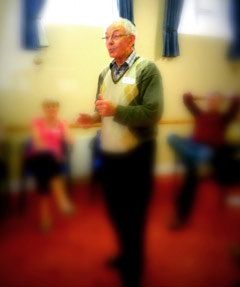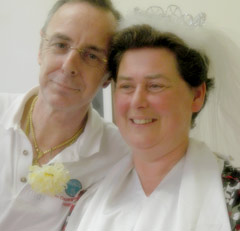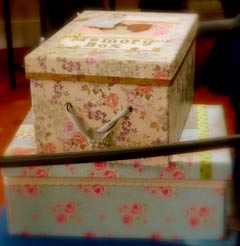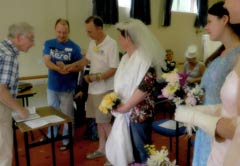Review of RTRT project: Ireland - North-West, Donegal

Memorable moments that took place in our RTRT group
-
“It was really enjoyable”
“Great craic”When one of the ladies spontaneously burst into song with great gusto and enjoyment and filled the room with joy and light!
-
The verbal contributions made by another lady were remarkable, as she was someone who would not verbally engage at any level on other occasions outside the reminiscence sessions; she clearly and coherently described baking bread and asked probing questions
-
The enjoyment of a lady who took the part of ‘the Bride’ in ‘the Wedding’ role play; the fun and joy that she radiated to the room was palpable, we could see her confidence grow and she was for that moment a lady who was very young.
-
The quiet engaging way one of the men in the group had about him, he loved and relished the ‘one on one’ work; he loved to sit with his volunteer and talk, he had real ‘wit’ and was great with the ‘one liners’.
The main things we have learned

Successes to build on:
-
The age profile of the participants of our group was very wide; from mid 40s to early 80s; this was both challenging and also rewarding. Challenging in terms of maintaining the relevance of the material to everyone across the age range, and rewarding in the fact that there was a tremendous sharing of experience and learning between the generations.
-
 We, like our partner organisation in Dublin, did not use the term ‘dementia’ in any of the sessions where everyone was together. Keeping the term ‘dementia’ out of the conversation allowed all group members to feel they were equal participants with equal ability to give to the group and not that half the group are somehow less than the others.
We, like our partner organisation in Dublin, did not use the term ‘dementia’ in any of the sessions where everyone was together. Keeping the term ‘dementia’ out of the conversation allowed all group members to feel they were equal participants with equal ability to give to the group and not that half the group are somehow less than the others. -
Using a themematic based approach for each session and letting participants know in advance, gave the sessions structure (with inherent flexibility) and allowed group members to prepare for the theme, eg., school days, work days, special occasions, by collecting items from home.
Pitfalls to avoid:
-
Aspects of the venue such as ‘parking’ for participants proved a significant difficulty. The venue we choose was very good, but the parking was extremely limited, and this minor difficulty proved to be a real issue in relation to getting people to the venue on time etc.
-
Seven sessions (which was what we delivered) was felt to be not enough to comprehensively explore the various types of reminiscence options available. It was more akin to a taster of reminiscence work, which was very good in that it gave carers ideas of what they could use at home, but more sessions would probably have consolidated the experience for them. Also, it is takes group members several weeks to bond and form a cohesive group so the group is disbanded just as this has taken place. A further six weeks would have been of greater impact, “…we could see that as the sessions grew they (the participants) grew with them”
-
Realising and accepting that it doesn’t work for everyone, it is not a panacea, and for some people it is not wholly apparent or clear what they are taking away from the process beyond the social engagement, but notwithstanding it is still extremely valuable.
The main things that the carers in our groups learned about reminiscence

-
The realisation that reminiscence work has a real depth to it, that goes way beyond simply looking at photographs onto a wider, broader, more colourful path.
-
Carers saw their family members interacting in a different light
-
That reminiscence is a voyage of discovery going on
-
The carers acquired a skill-set
-
That using creative methods of engaging e.g. Drama, mime, song, music, dance can enable a person with limited communication to participate in and enjoy an activity and have fun
What the people with dementia in our groups gained from the project:

-
Increased confidence and enhanced self-esteem would be the most significant
-
A sense of ‘being themselves’ in that moment, remembering that part of themselves that perhaps they thought was lost
-
Simple ‘enjoyment’ – enjoying themselves - free expression
-
The being together as one group and socialising together
-
The use of thematic approach made it easier to embrace the topics and themes; because of the commonality of experience
Future plans
Plans for future reminiscence work in dementia care:
There was a real sense that this 7-week programme was a type of pilot programme and there now is an identified need to sustain the work going forward. Active efforts are being made to put in place resources to enable the creative reminiscence work to continue on an ongoing basis.
Plans to develop reminiscence projects in other contexts:
We are currently actively involved with a very exciting Reminiscence Project throughout Donegal which has largely stemmed from this current programme, it is called – A Sense of Memory” – A Reminiscence Theatre Project jointly produced by ourselves, The Voice of Older People Donegal, An Grianan Theatre, Reminiscence Network Northern Ireland and the Alley Theatre, Strabane.
We are embarking on a journey to travel along the routes of the railways of Donegal Derry and Tyrone collecting stories from groups of older people who lived and worked beside the tracks that stretched across the Northwest of Ireland www.senseofmemory.net








